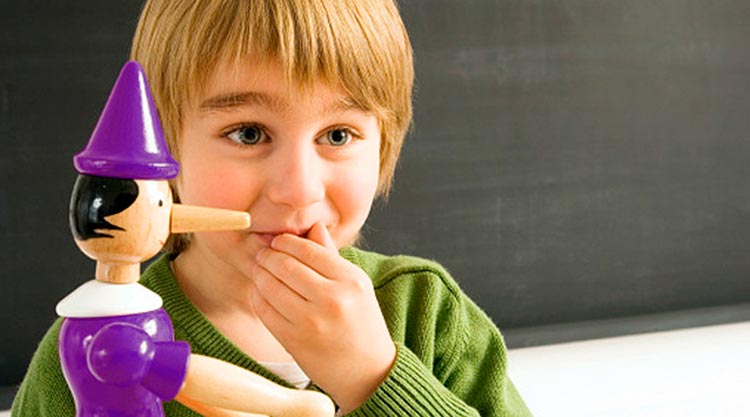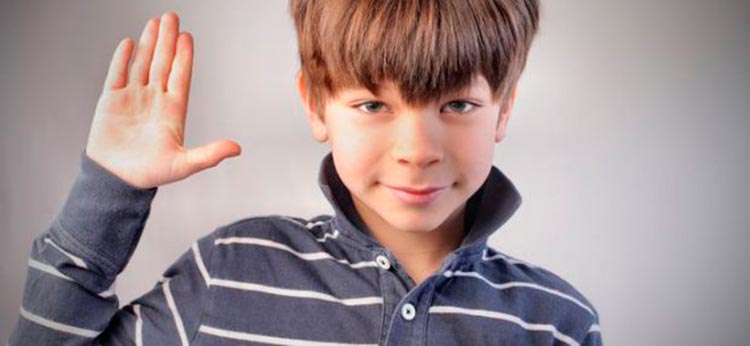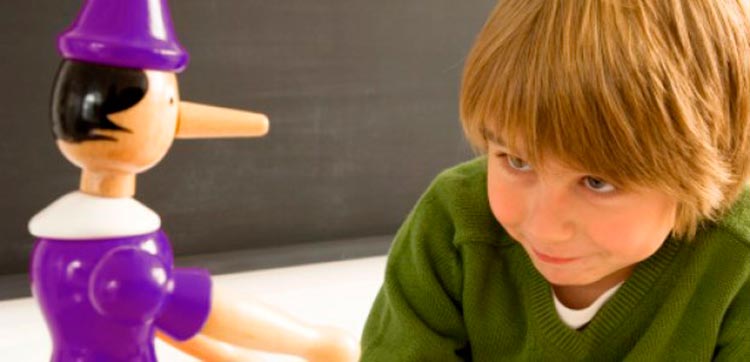Many parents periodically catch their children on the fact that they tell a lie. Kids tend to come up with different stories, embellish facts and fantasize. If you do not react to this in any way, the child will continue to lie at an older age and will grow into a pathological liar. How to wean a child from lying? Use the advice of psychologists - they will help you establish a trusting relationship with your son or daughter and make sure that the child always tells you the truth.

Children's lies - the norm or pathology?
According to some psychologists, the tendency to cheat is a normal stage in the development of a child. Everything that the baby sees, hears and feels in the first years of life is new and incomprehensible to him. The child has to process a lot of information, learn to use it every day.
For an adult, it is obvious where the fact is, and where is the invention, but the baby only has to understand this. His logical thinking is at the stage of formation. Therefore, the baby sincerely believes in Santa Claus, a woman and fairy tales that his parents tell him. If the child cannot understand or explain something, he connects the imagination. At certain points, reality and fantasies mix with each other. As a result, parents catch the baby in a lie, although the child himself is sincerely sure that he is telling the truth.
Another thing is if the children consciously begin to cheat. This usually happens if adults forbid something to the child. The kid in this case begins to reflect on how to achieve the desired, and the most obvious way is to cheat. Children's logic is something like this: "If this is not so, then it will become possible if I say differently." Therefore, babies begin to consciously lie and manipulate adults. It is important for parents to take action in time, otherwise an innocent child deception will turn into a habit of always achieving the desired with the help of lies.
Reasons for childhood lies
Often, kids tell a lie, because they take their fantasies for reality. However, children's lies can be quite deliberate. A variety of reasons lead to it, including:
- the desire to get what parents prohibit;
- lack of attention on the part of parents or a desire to seem better than he really is;
- fear of punishment for misconduct;
- self-justification;
- dissatisfaction with living conditions;
- mismatch with parental expectations;
- pathological lie.
Let us consider the causes of children's lies in more detail, so that it will be easier for parents to figure out what is happening with their child.

The desire to get what parents forbid
Example: the child has already eaten sweets, but wants more. He tells his mother that dad allowed me to take sweets (although he still hadn't come home from work). “I didn’t know how much time I was late home” ... etc.
Solution to the problem: stop banning everything. Kids begin to lie if they constantly hear the word "not", because it causes a protest. Therefore, they try to use a lie to defend their interests. Review the bans, reduce their number and leave only those that directly relate to the child’s health, safety, educational moments, regimen, and nutritional traditions. Only if you give your child more independence will he be able to learn to be responsible for his actions. It will not be superfluous to tell the baby that you can get what you want not only through deception. Tell him that it’s enough to just ask for the same toy, explaining why it is so needed. In addition, the child must understand that it is important to behave well - then adults will encourage him for obedience.
We also read: How to tell a child “DO NOT”
Lack of parental attention or desire to seem better than he really is
Example: the child began to seriously talk about his superpowers - incredible strength, agility, intelligence, courage, endurance - although it is obvious to an adult that the child is trying to pass out wishful thinking.
Solution to the problem: How do parents relate to this? How to lie or how to fantasy? If the baby is lying and trying to give out wishful thinking, this is an alarm. He indicates that the child is looking for ways to interest loved ones, which means that he does not have enough warmth, affection, attention and support from his parents. Let the baby feel your love. Give your child more attention and develop your child’s abilities. Explain that each person has his own talents. Someone rides well on a skateboard, someone sings or dances great, and someone knows everything about the Egyptian pyramids or space. So you need to develop and show your real abilities, and then no one will consider a liar or a boast. Read books and children's encyclopedias with him, walk, chat. Take your child to a club or sports section. So he will develop his real abilities, become more self-confident and will be able to show off real achievements.
[sc name = ”rsa”]
Fear of punishment for misconduct
Example: the child broke a vase and tries to put the blame on the cat or his younger brother so that he would not be scolded, deprived of something good, or, worse, not hatched.
Solution to the problem: be calm in relations with the baby, punish him only for serious misconduct, but not too severely. If they shout at a child for the smallest offense, scare him with flogging, constantly deprive him of sweets and watching TV, he begins to be afraid of his own parents. Too often and severely punishing the child, the parents provoke his desire to avoid them in any way. Make decisions on the fact: if the baby broke the cup - let it clean, if it offended someone - let it apologize, if it broke the toy - let it try to fix it, get a deuce - you need to work out and fix it. Such conditions are fair. They do not offend the dignity of a small person, so the need for a lie disappears by itself.
We also read: How to punish a child

Self-justification
Example: the child did poorly and tries his best to justify himself - he mumbles something inarticulate, finds thousands of excuses, blames other people to justify himself and tells how much he himself was offended (“He first started”).After that, a story is given about how the offender started first, what offenses he caused, etc. Note that the “offender” tells a similar story.
Solution to the problem: support the child in any situation and discuss with him everything that happens in his life. Childish lies aimed at self-justification are very difficult to eradicate. Pride does not allow the child to plead guilty, so he is looking for ways to whitewash himself. Talk to him softly and amiably, explain that you will not stop loving him, even if he was the first to take the toy from another boy or climb into the fray. When the child is sure that his parents will support him in any situation, he will trust them more.
Dissatisfaction with living conditions
Example: the child began to invent incredible stories about his parents that his parents are very rich, constantly give him toys, carry him to the sea, to distant lands, that dad is often shown on television. These dreams of a better existence indicate a child’s dissatisfaction with his social status. A child can understand such things as early as 3-4 years old, and at 5 years old he will have a good idea of who is rich and who is poor.
Solution to the problem: try to at least sometimes fulfill the wishes of the child and fight with childish greed. Already at the age of 3-4 years, children begin to realize that people differ in social status, and by the age of 5 a clear understanding of wealth and poverty comes. In the kindergarten there is always a child who was given more gifts for his birthday, who spent the summer with his parents more interestingly. This causes envy, and the baby begins to voice his dreams, passing them off as reality.
If a child is lying because he considers himself worse than other children because of his lower social status, look for the opportunity to give him at least part of what he dreams about. Maybe not just for that, but for the child to make a little of his own efforts . Regarding the "greedy" preschool children who are uncontrollably wishing to receive all the toys on earth, explain that this is unrealistic, but you can get good gifts from time to time.

Inconsistency with Parent Expectations
Example: the girl loves to draw, and her mother sees her as a musician; the boy wants to enroll in a radio club, and dad sees him as a talented translator. While the parents are not at home, they paint and design, and then they deceive that they worked hard on music or English. Or a child with quite average abilities, which parents want to see as an excellent student, talks about the bias of teachers, justifying their low level of success.
Solution to the problem: Unfortunately, it happens that the expectations of parents are a heavy burden for children. Often adults want their children to do what they did not do. Think about whether your expectations contradict the inclinations and interests of the child? It’s unfair to make him show abilities and achieve goals in your place (in accordance with your unfulfilled childhood dreams), “for you in childhood”. For example, my mother could not become a translator, but now she is forcing her son to learn a foreign language. These expectations may not correspond to the interests of the baby. Parents should listen to the wishes of the children. Not wanting to upset a loved one, the child will begin to lie and dodge, but still will not succeed in an unloved occupation. Better let your child go his own way - then the fraud in your family will become less.
Pathological lie
Example: the child constantly uses lies for mercenary purposes - he lies that he did his homework to let him go for walks, transfers the blame to another in order to avoid punishment, etc.
Solution to the problem: specialist assistance required. Pathological lies are a rather rare phenomenon in childhood. If a child is constantly cheating, trying to manipulate others, then he needs to be shown to a psychologist. He will help you choose the solution for your specific case.

How does a lie manifest in children of different ages?
Parents can hear the first lie from their 3-4 year old children.By the age of 6, the child is already aware of his actions and realizes that he is lying. However, in general, it can be difficult to understand whether the baby is lying consciously or really believes in what he came up with.
As a child grows up, the motives that push him to cheat also change:
4-5 years old. Children of this age are vivid imagination. They still believe in fairy tales, magic and often confuse reality with a fictional world. Often, preschoolers lie unknowingly - they simply give out what they wish for reality (these are the features of their development). Therefore, what a child of 4-5 years old says cannot be regarded as a lie. You need to treat this as a fantasy.
7-9 years old. At this age, all actions and words of a person become conscious. Schoolchildren are already able to draw a line between their fantasies and reality. They begin to deceive on purpose, exploring the possibilities of lying, using it for their own purposes. If a child begins to lie often, parents should beware. Serious problems can be hidden behind constant lies.
How to explain to the child that lying is bad?
Children's lies are a problem that needs to be addressed. If you notice that your child is trying to use a lie for his own good, first of all, you need to analyze the behavior of the child, speak with him openly and try to understand what is the reason for dishonesty. After all, children usually do not lie just like that, certain circumstances always push them towards this. When you understand them, you can find a way to stop childish lies.
Use the following tips to convey to your child what to deceive other people is not good:
- Talk more often with your child, discuss the topics of good and evil. As examples, one can cite situations from films, cartoons, and fairy tales. The child must understand that happiness, success and luck accompany good heroes, and good always conquers evil.
- Prove the inadmissibility of a lie by personal example. If dad, being at home, asks his mother to answer the call and say that he is not there, the child forms a loyal attitude to lies. Do not allow such situations, demand honesty from households.
- Tell the child that there is a “polite lie” that involves a tactful attitude towards people so as not to offend them (for example, when they did not like a birthday present).

Psychologists' recommendations for raising an honest child
Psychologists give parents a number of useful recommendations that help to cope with children's lies:
- Distinguish fantasies from deceit. Remember that preschoolers often blur the line between fiction and reality. If the baby has too much imagination, maybe he just has nothing to do - diversify the child’s leisure.
- Do not punish for cheating. Your cries, indignation and scandals will only tell the child that the lie should be hidden more strongly and as a result will lead to the fact that the child does not stop lying, but only begins to better hide his lie.
In order for the need for lies to disappear, the child must be sure that loved ones:
- trust him and each other;
- never humiliate him;
- take his side in a controversial situation;
- Do not scold or reject;
- support in any difficult situations and give good advice;
- if punished, then fair.
It’s better to teach your child not to lie than to punish him all the time. Do you want your child to be honest? Make the truth a cult in your family. Praise your child for honesty.
We also read:
- 5 main reasons why a child is lying
- How to raise an honest child
- When a child’s fantasies become dangerous
Video plot: the child is lying. What to do?
Children's lies - an interview with children's psychologist Alexandra Bondarenko









My daughter is four years old and when I see that she is lying, I always ask, “why is she doing this?” To which she replies that she was joking and we laugh together. I never scold her for this, it’s not a pathological lie, but the ability to cheat on her in life is still useful.
I have the opposite situation, the son from 3 years old began to lie to neither me nor dad. And to strangers. For example, we were visiting friends in another city, and our son saw them very rarely. At night we forbade drinking a lot of water, eating watermelons. He began to ask friends to eat watermelon, and to which he said that mom allowed. I talked with my son that you can’t lie. But no use. It’s very difficult to control lies not in our presence. And always where there are prohibitions there will be a desire.
My daughter at 10 years old began to gain much weight and I began to forbid her to eat flour, sweet before bedtime. And after some time I began to notice that she takes and eats without permission, when I am busy and do not see. Whether you took my questions or not, she began to deceive and convince that she did not touch. I realized that the ban forces children to deceive. Now I try to explain to her that you can’t do this, it’s to the detriment of herself.
It seems to me that many parents themselves tend to deceive their children. And when the baby is already beginning to distinguish truth from lies, he has the impression that sometimes you can lie. So my advice is: be honest with your children.